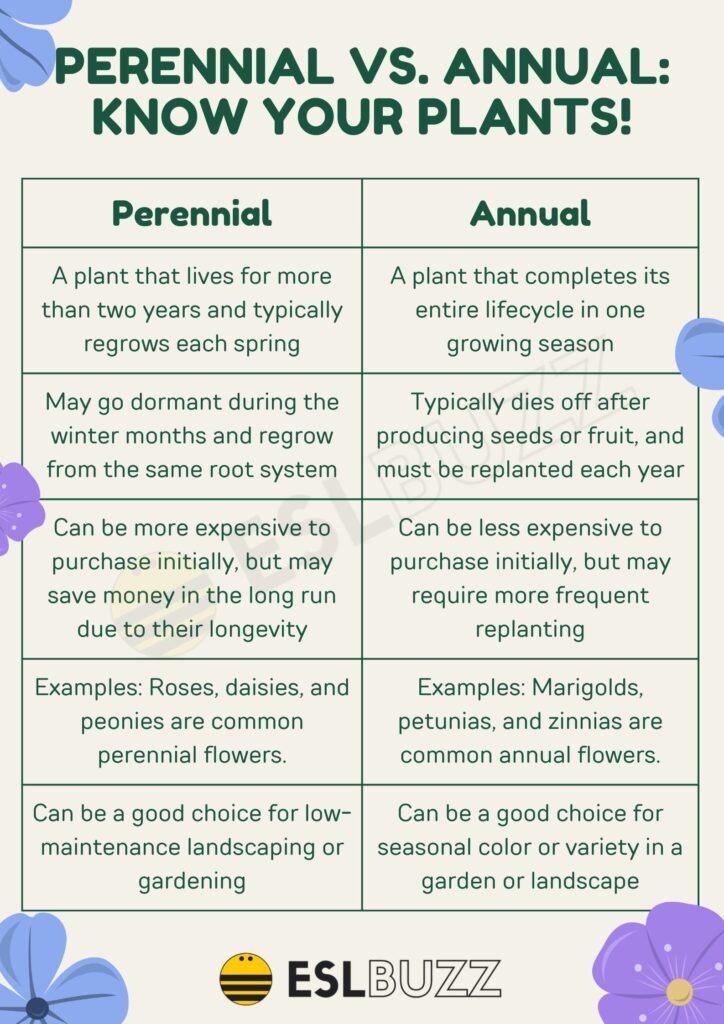The Annual Vs. Perennial Debate: Which Flowers Should You Plant?

Table of Contents
Understanding Annual Flowers
What are Annual Flowers?
Annual flowers complete their entire life cycle – from seed to flower to seed – within a single growing season. This means they'll bloom beautifully, then die back by the first frost. This short lifespan is their defining characteristic.
- Examples of popular annuals: Zinnias, petunias, marigolds, impatiens, cosmos, sunflowers. These offer a dazzling array of colors and forms, perfect for creating vibrant displays.
- Think of annuals as the "fast fashion" of the plant world: they offer quick, intense color and are easily replaceable.
- However, their short lifespan means you'll need to replant them every year, leading to ongoing costs.
Advantages of Annual Flowers
Annuals offer several compelling benefits for gardeners:
- Wide variety of colors and types: The sheer range of annual flowers is astonishing, giving you endless options to match your style and color preferences. You can find annuals in virtually every color imaginable, and in various forms – trailing, upright, bushy.
- Fast-growing: Annuals quickly fill spaces, providing instant gratification and a fast transformation for your garden. This is perfect for adding pops of color to bare spots or creating a lush, instant look.
- Great for filling gaps: Need to quickly fill a space left by a late-blooming perennial or disguise an unsightly area? Annuals are your best bet.
- Excellent for containers and hanging baskets: Their compact growth habit makes them ideal for containers and hanging baskets, adding beauty to patios and balconies.
- Often less expensive initially: The initial cost of annual flower seeds or seedlings is typically lower than that of perennials.
Disadvantages of Annual Flowers
While beautiful, annuals do have downsides:
- Require yearly replanting: This is the most significant drawback. You must purchase and plant new flowers every spring.
- More maintenance: Annuals often require more frequent watering and fertilizing to maintain their vibrant blooms.
- Shorter lifespan: Their short life cycle means you won't enjoy their beauty for very long.
- Not ideal for all climates: Some annuals are sensitive to frost or extreme heat, limiting their suitability depending on your location.
Exploring Perennial Flowers
What are Perennial Flowers?
Perennial flowers live for more than two years, returning year after year to grace your garden. They may die back in winter but will re-emerge in the spring, providing a long-term investment in your garden's beauty.
- Examples of popular perennials: Coneflowers, daylilies, hostas, lavender, salvia. These offer reliable beauty and often attract beneficial pollinators.
- Think of perennials as the "classic wardrobe" of your garden – reliable, stylish, and long-lasting. Their initial cost is recouped through years of enjoyment.
Advantages of Perennial Flowers
The longevity of perennials offers many advantages:
- Come back year after year: This is their main draw – they eliminate the need for yearly replanting, saving you time and money.
- Less maintenance once established: While they might require some care initially, established perennials are generally more low-maintenance than annuals.
- Greater biodiversity for pollinators: Many perennials attract bees, butterflies, and other beneficial insects, contributing to a healthy garden ecosystem.
- Can be more cost-effective in the long run: Although the initial investment is higher, the long-term savings make them a worthwhile choice.
- Create a more established and mature garden look: Perennials contribute to a more established, layered, and natural look over time.
Disadvantages of Perennial Flowers
Perennials aren't without their challenges:
- Slower growth initially: It takes time for perennials to establish themselves and reach their full potential.
- Might need dividing or thinning: To prevent overcrowding and maintain vigor, some perennials require periodic division or thinning.
- Can be more expensive upfront: The initial cost of perennials is usually higher than that of annuals.
- May require specific soil and sunlight conditions: Perennials often have specific needs in terms of soil type, pH, and sunlight exposure.
Choosing the Right Flowers for Your Garden
Factors to Consider
Selecting between annuals and perennials depends on several factors:
- Climate: Hardy perennials are suitable for colder climates, while some annuals thrive in warmer regions.
- Garden size: Annuals are perfect for smaller gardens or containers, while perennials are well-suited for larger spaces.
- Personal preferences: Do you prefer the vibrant, fast-changing look of annuals or the dependable beauty of perennials?
- Time commitment: Annuals demand more ongoing maintenance, while established perennials require less attention.
- Budget: Consider the initial cost and long-term expenses of each type.
- Desired garden aesthetic: Annuals offer bright, bold colors, while perennials often create a more natural, textured look.
Combining Annuals and Perennials
The best approach often involves combining both annuals and perennials!
- Use perennials as a foundation, providing structure and year-round interest.
- Fill gaps between perennials with annuals for bursts of color throughout the growing season.
- Let annuals provide seasonal highlights, while perennials provide the enduring beauty.
Conclusion
The "Annual vs. Perennial Flowers" decision depends largely on your individual gardening goals, experience level, and aesthetic preferences. Annuals offer instant gratification and a wide variety of color choices, while perennials provide long-term beauty and less maintenance in the long run. By carefully considering the advantages and disadvantages of each, and perhaps even combining both, you can create a garden that reflects your unique style and flourishes year after year. Start planning your dream garden today with the right mix of annual vs. perennial flowers!

Featured Posts
-
 Lush Nyc 30 Minute Bubble Bath Experience For 75
May 29, 2025
Lush Nyc 30 Minute Bubble Bath Experience For 75
May 29, 2025 -
 Pembeli Nft Nike Digugat Gugatan Rp 84 Miliar
May 29, 2025
Pembeli Nft Nike Digugat Gugatan Rp 84 Miliar
May 29, 2025 -
 Nieuwe Aanhouding Na Paasschietincident In Venlo Update
May 29, 2025
Nieuwe Aanhouding Na Paasschietincident In Venlo Update
May 29, 2025 -
 State To Conclude Case Against Joshlin Smith Soon
May 29, 2025
State To Conclude Case Against Joshlin Smith Soon
May 29, 2025 -
 Akutt Nyhetsvarsel Brann Odelegger Fire Bater I Oslo
May 29, 2025
Akutt Nyhetsvarsel Brann Odelegger Fire Bater I Oslo
May 29, 2025
